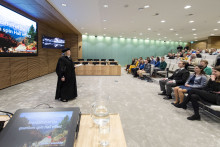‘UT has made a big effort to support female academics in the last years. Although the number of female professors is increasing - it is now 12,7% and it was only 5% ten years ago -, there is still place for improvement. The UT's goal is to get to 20% by the year 2020 and FFNT wants to support this,’ continues Magnanimo. ‘Main goal is to make a bridge between the strategy of the university's administration and the needs of female academics. We want to work from the top down and merge the two groups: administrative and academic.’
Management and academics together
In 2017, FFNT will put these plans into action. The network will organize a series of events that will include both members of FFNT as well as of the UT management team. ‘We want to advise the management on possible strategies for ensuring female scientists with the right career path and we intend to constantly support the management towards reaching gender equality,’ explains Vanessa Magnanimo.
Besides regular lunch activities, FFNT will hold a meeting with the UT EU office to discuss how gender issues are dealt with in the Horizon2020 program. FFNT would also like to focus on PhD candidates this year. ‘The academic career path starts at the PhD level, and so it is important to raise gender awareness and provide trainings intended specifically for PhD researchers, because their needs are very different from other academics,’ clarifies Magnanimo.
International female academics
‘In discussion with the Twente Graduate School (TGS), we realized that the integration for international female scientists requires particular attention. We therefore want to closely collaborate with TGS and talk about specific issues international females deal with,’ says Vanessa Magnanimo, who has firsthand experience on the topic.
‘When I came to the UT, I felt that my personal experiences weren't only mine and I wanted to share them with others. FFNT is the perfect framework for that. I joined the board because, as an international female academic in a Tenure Track, I can help shine light on issues this group goes through and help solve them, which will result in attracting more talent to the university.’
New survey in 2017
As Magnanimo mentions, attracting talent is only one side of the story. FFNT also wants to make sure that talent stays at the UT. ‘In 2015, FFNT did a survey to highlight reasons for satisfaction in female academics. Besides that, we looked at reasons why researchers leave. While for most men it was an issue of salary, 65% of women stated that the main reason for leaving was a missing career path,’ says the FFNT chairwoman. ‘We are planning a new survey for 2017 to see if this is still true. These findings are a useful instrument to guide our decisions and know what needs to be done.’







